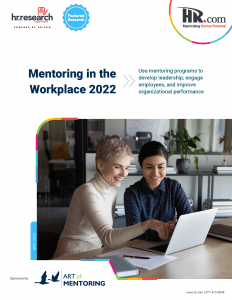Start building a culture of growth today.
Join the hundreds of organisations embedding mentoring and empowering their teams with the Art of Mentoring.
< 1 min read

The concept of mentoring is certainly not something new. In fact, the word originates from a character in Homer’s classic poem “The Odyssey,” which dates back to three millennia ago.
But that doesn’t mean that the concept has been static. Traditional mentoring relationships have often formed naturally, with older people often passing along knowledge and wisdom to younger ones. Structured mentoring programs in organizations have become a powerful tool for learning and development. A core set of best practices have emerged to guide organizations.
To better understand this evolution and current trends, we partnered with the HR.com Research Institute to hear from over 330 industry professionals in virtually every industry vertical.
In this study, we explore a variety of related topics:

Download our introductory guide ‘The Ripple Effect’ to mentoring and learn the secrets to unleashing hidden value in your organisation

Compiled by our mentoring experts, this guide will introduce you to the secrets of unleashing hidden value in your organisation.
Art of Mentoring CRM needs the contact information you provide to us to contact you about our products and services. You may unsubscribe from these communications at any time. For information on how to unsubscribe, as well as our privacy practices and commitment to protecting your privacy, please review our Privacy Policy.
"*" indicates required fields
Join the hundreds of organisations embedding mentoring and empowering their teams with the Art of Mentoring.

By subscribing, you agree to Art of Mentoring contacting you about our products and services. You may unsubscribe from this communicaiton at any time using the ‘unsubscribe’ link at the bottom of our emails. The Privacy Policy, located on our website outlines our commitment to protecting your privacy.
"*" indicates required fields